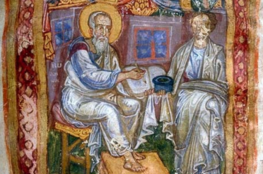Over at the old Opus Publicum site, I wrote a brief commentary on Steve Robinson’s Ancient Faith Radio podcast episode about his decision to stay in the Eastern Orthodox Church. Here’s what I had to say.
Steve Robinson, the great wit and honest soul behind the sadly defunct Pithless Thoughts web-log, returned to his Ancient Faith Radio podcast earlier this year. Robinson’s “re-debut” came accompanied with a moving, albeit general, account of where he had been spiritually for the past few years. His latest installment, “Staying Orthodox,” provides one of the best accounts I have ever encountered about why people convert to the Eastern Orthodox Church and how to stay there. Robinson’s reflection on these sensitive matters is open and non-polemical, which is as refreshing as it is rare. Many of Robinson’s thoughts can be applied to the experience of converts to Catholicism, particularly those who entered the Catholic Church during the comparatively steady reign of Pope Benedict XVI and now find themselves being thrown about in the sea of chaos which is the Pontificate of Francis. Some, however, are fairly limited to the unique challenges which attend to trying to be a first-best Orthodox Christian amidst a second-best reality.
Personally speaking, I cannot identify directly with Robinson’s book-based or intellectual conversion experience because for me, becoming Orthodox was more like switching teams between divisions after a prolonged period on the Disabled List rather than going from the American League to the National League (or even to another sport altogether). With that said, I quickly shared Robinson’s affinity for attempting to grasp the ways and means of Orthodoxy through thick theological tomes, collections of spiritual writings from ages past, and a scrupulous understanding of canons, customs, and cockamamie spiritual advice. Robinson, having seen much more of “on-the-ground” Orthodoxy than I ever did, fought the good fight to stay faithful to his conversion as long as he could before realizing that retreating away from the beauty and banality, greatness and grotesqueness, and surety and senselessness of the Orthodox Church was the only option he had left.
I’ll stop there. I don’t want to spoil Robinson’s account any further, and there is no way I can recreate the power of words which so clearly emanated from his heart. Although I share a different confessional commitment than Robinson, I can sympathize with what he has gone through and the great trials any man must undergo to follow their conscience amidst the confusion of the present age.
Despite frequent requests to do so, I have largely refrained from discussing publicly why I left the Eastern Orthodox Church in 2011 to rejoin Catholicism. My reasons for this are twofold. First, I have little-to-no interest whatsoever into turning my blog into a repository for Catholic/Orthodox polemics. Some years ago, when I opted to start writing critically on certain trends in the Orthodox Church, I found my combox flooded with angry rants, accusations, and all sorts of unedifying statements. Since then, people have either grown tired of fighting or, I hope, accepted the fact that my frank discussions of Orthodoxy are not intended to be triumphalistic. As I have maintained and still maintain, my love for the Eastern Orthodox Church runs deep; and though I cannot, in good conscience, profess adherence to Orthodoxy while it remains outside of communion with Rome, I do not wish ill on her or her followers. Like many Catholics, I hope and pray for the day when Catholics and Orthodox will come together, united by Christ in the Eucharist and professing the fullness of the Apostolic Faith.
Second, I don’t think my “conversion story” is all that interesting.
What is interesting, however, is reading and listening to others account for why they have decided to stay Orthodox despite the many difficulties they face in doing so. Orthodoxy, particularly in America, is often “sold” as a safe haven from the problems of (post)modernity; it also has the benefit of retaining a valid hierarchy and sacraments without the socio-cultural baggage associated with Catholicism. Liturgically speaking, Orthodoxy has a leg up on Catholicism and for those who don’t care for “pelvic matters,” its moral instruction is loose enough to allow for behaviors once condemned by all Christians, everywhere. On the flipside, American Orthodoxy is beset by poor oversight and leadership due to a limited resource pool for bishops; many of its priests lack the education and discipline to properly pastor a parish; a significant number of parishes, if not entire jurisdictions, remain ethnic ghettos or cultural centers; Orthodoxy’s “magisterium” extends no further than the church building’s front door; and the wave of conversions that have occurred since the 1990s has infected certain segments of American Orthodoxy with a Protestant mindset. Moreover, Orthodoxy, both in the United States and throughout the world, often lacks the capacity for self-criticism, resulting in alarming streaks of anti-intellectualism, chauvinism, and triumphalism.
While many who choose to remain Orthodox are cognizant of these realities, a noticeable number either are not or choose to ignore them. How long they can maintain this ignorance is an open question. For those who stay Orthodox with their eyes open, it seems that they have found a way to reconcile their faith with where they are at concretely. That is to say, instead of “escaping to Byzantium” or LARPing a Russian peasant from a Dostoevsky novel, they embrace Eastern Christianity within their decidedly Western context. Not content with pious myths about Orthodoxy’s “glorious past” or the belief that Greece or Russia represents a “Holy Mothership” where Orthodoxy flows free and pure, these Orthodox Christians recognize the contradictions, compromises, and capitulations found within their communion. In short, they know that the Orthodox Church is both a divine and all too human institution that must come to terms with its own past if it wishes to be anything more than a museum in the present.
At the same time, I suspect that more than a few Orthodox decide to remain where they are because the other options are less-than-appealing. For instance, I have conversed with several Orthodox Christians at length who have long considered uniting themselves with Rome only to be turned off by the ongoing and very public crisis which has gripped the Catholic Church for more than 50 years. While some were heartened by the liturgical decisions taken by Pope Benedict XVI, they view Francis’s pontificate with deep suspicion. Like many traditional Catholics, these Orthodox do not see Papa Frank as a beacon of humility, but rather an unhinged autocrat whose rhetorical excesses and meddling confirm their worst fears about the papacy. And though Orthodox converts to Catholicism are not, by the terms of canon law, Latin Catholics under the Church of Rome, the relative scarcity of Greek Catholic parishes in the West means that they will have to get by in a predominantly Latin environment. What this means is that outside of traditional or “reform of the reform” parishes, they will be exposed to banal (if not sacrilegious) liturgies, poor catechesis, and heterodoxy from pew to pulpit.
None of this is to say that I believe anyone should stay Orthodox; but I do understand and sympathize with many Orthodox Christians who believe they cannot “go Rome” at this time. One of the great failures of American Catholicism, starting in the 19th century, was its refusal to open its arms and embrace Eastern Christian emigres. Today, American Catholicism falters by refusing to reach out openly and honestly to the Orthodox while continuing to treat Eastern Catholics as second-class citizens. Although it’s impossible to know how many might leave Orthodoxy for Catholicism were conditions better, the sheer size and scope of the Catholic Church, coupled with her immense resources, would likely draw more than a few into her fold. In the meantime, for those committed to Orthodoxy, the road is rough and uncertain. What that means for American Orthodoxy’s demographic future remains to be seen.



